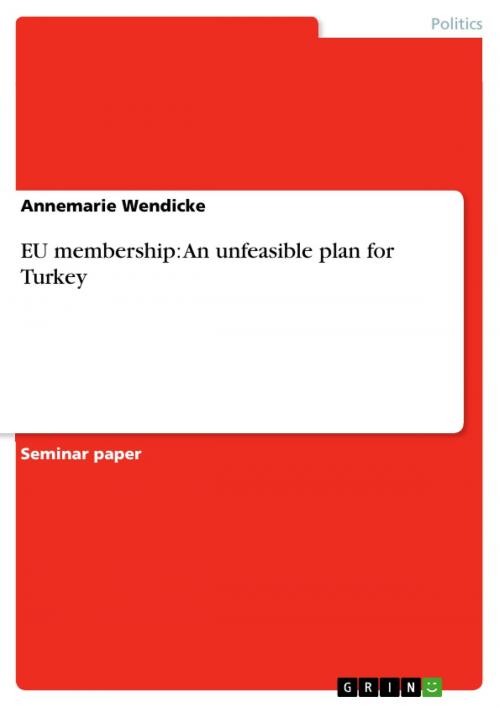EU membership: An unfeasible plan for Turkey
Nonfiction, Social & Cultural Studies, Political Science| Author: | Annemarie Wendicke | ISBN: | 9783638055871 |
| Publisher: | GRIN Publishing | Publication: | May 30, 2008 |
| Imprint: | GRIN Publishing | Language: | English |
| Author: | Annemarie Wendicke |
| ISBN: | 9783638055871 |
| Publisher: | GRIN Publishing |
| Publication: | May 30, 2008 |
| Imprint: | GRIN Publishing |
| Language: | English |
Seminar paper from the year 2008 in the subject Politics - International Politics - Topic: European Union, grade: A, Hawai'i Pacific University, 11 entries in the bibliography, language: English, abstract: Turkey has been trying to become a full member of the European Community since 1963, when an associate agreement was signed. It was one of the countries that established the OECD, an organization that represents democracy and free market economy. In 1995 Turkey started a customs union with the EU, which was the first step toward a full membership of the EU. At the European Council in Helsinki, Turkey was considered as a potential candidate for full membership of the EU. According to the European Council (2003), 'Turkey is a candidate state destined to join the Union on the basis of the same criteria as applied to other candidate states.' As mentioned in the statement, the European Union is willing to offer Turkey a full membership as long as they fulfill the criteria for membership provided by the European Commission. In other words, Turkey has to share 'the values, objectives and legal order set out in the [EU] treaties.' Therefore, the EU developed a pre-accession strategy for Turkey and agreed on an accession partnership on the same basis as the other candidate countries, which negotiated a treaty with the EU. For that reason, Turkey was allowed to participate in certain EU programs and meetings among the member states of the EU and the candidate states. Although formal discussions have taken place since 2005, the member states have not reached an agreement yet. Turkey's EU accession is the leading controversy among the member states of the EU concerning the enlargement of the European Union. Some member states are in favor of Turkey's EU membership due to its geographical location, which could be a benefit for the European Union; whereas other countries are concerned about the situation within Turkey and its effects on the European community. Turkey should not become a full member of the European Union because of a violation of human rights based on Turkey's ideology, security reasons, and the financial risk for the economy of the European Union. Consequently, a privileged partnership would be more appropriate.
Seminar paper from the year 2008 in the subject Politics - International Politics - Topic: European Union, grade: A, Hawai'i Pacific University, 11 entries in the bibliography, language: English, abstract: Turkey has been trying to become a full member of the European Community since 1963, when an associate agreement was signed. It was one of the countries that established the OECD, an organization that represents democracy and free market economy. In 1995 Turkey started a customs union with the EU, which was the first step toward a full membership of the EU. At the European Council in Helsinki, Turkey was considered as a potential candidate for full membership of the EU. According to the European Council (2003), 'Turkey is a candidate state destined to join the Union on the basis of the same criteria as applied to other candidate states.' As mentioned in the statement, the European Union is willing to offer Turkey a full membership as long as they fulfill the criteria for membership provided by the European Commission. In other words, Turkey has to share 'the values, objectives and legal order set out in the [EU] treaties.' Therefore, the EU developed a pre-accession strategy for Turkey and agreed on an accession partnership on the same basis as the other candidate countries, which negotiated a treaty with the EU. For that reason, Turkey was allowed to participate in certain EU programs and meetings among the member states of the EU and the candidate states. Although formal discussions have taken place since 2005, the member states have not reached an agreement yet. Turkey's EU accession is the leading controversy among the member states of the EU concerning the enlargement of the European Union. Some member states are in favor of Turkey's EU membership due to its geographical location, which could be a benefit for the European Union; whereas other countries are concerned about the situation within Turkey and its effects on the European community. Turkey should not become a full member of the European Union because of a violation of human rights based on Turkey's ideology, security reasons, and the financial risk for the economy of the European Union. Consequently, a privileged partnership would be more appropriate.















